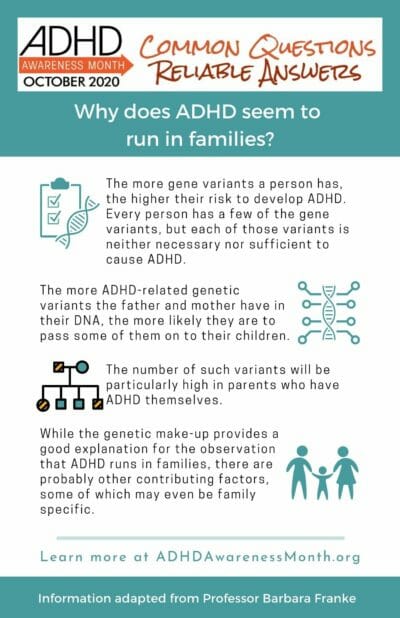Part of the reason why ADHD runs in families is down to genetics: ADHD has a high heritability of around 70-80%. What this means is that in an average person with ADHD, 70-80% of the inattention and/or hyperactivity can be explained by contributions of variants in genes. Those variants in genes are not only present in people with ADHD – every person has a few, and each of those variants is neither necessary nor sufficient to cause ADHD. However, the more of those variants a person has, the higher their risk to develop ADHD. The average person with ADHD probably has tens to hundreds of those gene variants in their genetic make-up.
The genetic make-up of a person is determined by the combination of genetic material (i.e. DNA) of their father and mother during conception. The more ADHD-related genetic variants father and mother have in their DNA, the more likely they are to pass some of them on to their children. As indicated above, the number of such variants will be particularly high in those parents that have ADHD themselves. Thus, those with ADHD are likely to have a high-risk genetic make-up and pass it down to their children.
While the genetic make-up provides a good explanation for the observation that ADHD runs in families, there are probably also other factors contributing, some of which may even be family-specific.
Download Printable article
Infographic as Image or PDF
About the Author

Barbara Franke is a Professor of Molecular Psychiatry at the Radboud University Medical Center in Nijmegen, The Netherlands. She studies the genetic factors involved in psychiatric disorders, especially ADHD, and investigates the biological pathways that lead from variants in genes to alterations in the brain and to symptoms.
Read more about:
- Read more about genetic studies in ADHD and heritability: Faraone SV, Larsson H. Genetics of attention deficit hyperactivity disorder. Mol Psychiatry. 2019 Apr;24(4):562-575. https://www.nature.com/articles/s41380-018-0070-0
- Read more about the factors that contribute to ADHD: Larsson H, Asherson P, Chang Z, Ljung T, Friedrichs B, Larsson JO, Lichtenstein P. Genetic and environmental influences on adult attention deficit hyperactivity disorder symptoms: a large Swedish population-based study of twins. Psychol Med. 2013 Jan;43(1):197-207. https://www.researchgate.net/publication/230677844_Genetic_and_environmental_influences_on_adult_attention_deficit_hyperactivity_disorder_symptoms_A_large_Swedish_population-based_study_of_twins
- Read more about ADHD across the lifespan: Franke B, Michelini G, Asherson P, Banaschewski T, Bilbow A, Buitelaar JK, Cormand B, Faraone SV, Ginsberg Y, Haavik J, Kuntsi J, Larsson H, Lesch KP, Ramos-Quiroga JA, Réthelyi JM, Ribases M, Reif A. Live fast, die young? A review on the developmental trajectories of ADHD across the lifespan. Eur Neuropsychopharmacol. 2018 Oct;28(10):1059-1088. https://www.ncbi.nlm.nih.gov/pmc/articles/PMC6379245/.

